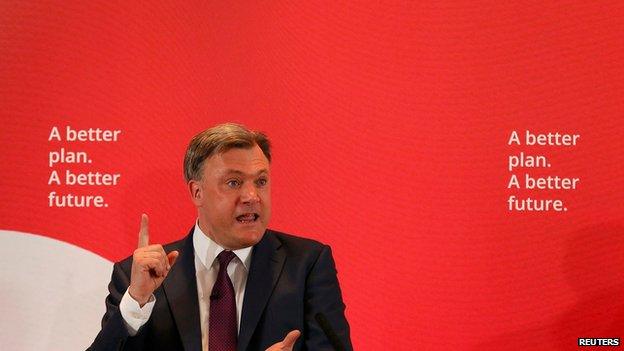Reality check: Attitudes to the economy
- Published

Labour shadow chancellor Ed Balls says voters on the doorsteps tell him they are not feeling the benefits of the growing economy. Is he right? Do these canvassing conversations match the national mood? And what do the polling companies have to say?
Lots of organisations measure how confident people feel about the economy in general or their own situation in particular. Their findings don't always agree.
This is the index of consumer confidence as measured by YouGov and the Centre for Business and Economics Research.
In 2008 during the financial crisis and the banking crash you'll see consumer confidence fell dramatically, recovered briefly in 2010, then really started to go up again in 2013, though you may be able to see it fell very slightly between January and April this year. Not much support for Ed Balls there, you might think.
But look at another chart from the same survey, asking people whether their own household was better or worse off than the previous month.
The number saying they felt better off has been going up; the number saying they were worse off has been going down. But there's still a significant gap: more people thinking they're worse off than better off. Which would appear to back up Ed Balls' claim.
This is Ipsos MORI's economic optimism index, going right back to 2004.
The red line shows those who think the general economic situation is going to get worse over the next 12 months; the green line those who think it'll get better. Recently the green line has been above the red line: they nearly met at the turn of the year, but they've just started moving apart again. Good news for the government; not much support there for Ed Balls.
But then there's the pollster Lord Ashcroft, who's been asking people whether they're feeling the benefits of recovery personally, and whether they expect to.
His poll from last September says the number who say they are feeling the benefits has been steadily rising, but still represents only a fifth or 20% of the people asked. Support for Ed Balls comes from the large numbers who say they're not feeling the benefits. On the other hand the real pessimists - those who say they're not feeling the benefits and don't expect to - seem to be falling in number; the optimists - who aren't feeling the benefits but think they might - has just ticked up.
Finally, here's GFK's consumer confidence barometer up to March.
On GFK's figures consumer confidence fell dramatically in 2008 and remained negative - people thought things weren't going to get better for the economy as a whole or for them personally right through until January. Which backs up what Ed Balls is saying - were it not for the fact that the most recent figure shows for the first time since 2008 that more people think things can only get better than think they're going to get worse.
Two conclusions. One is that a year or two ago surveys like this largely backed up what Ed Balls is saying: now it's much less clear. The second: take all such survey results with a dose of salt.